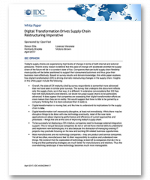Why Companies Must Embrace Digital Transformation Now
What you’ll take away from this paper is not just a deeper understanding of digital transformation - what it is, why it needs to be at or near the top of your strategic imperatives - but also how to begin your journey of transformation.
As a business leader, you’re thinking about disruption, you’re talking about disruption, let’s be honest, you’re concerned about disruption, and if you’re not, you should be.
Of course, businesses have always disrupted and replaced other businesses. In the early 1800s in England, factories with mechanical looms threatened to replace traditional shops making handwoven cloth, which led to riots among weavers fighting to save a way of life.
These weavers were literally the first Luddites, named after the fictional Ned Ludd, “general of the Army of Redressers.”
You can probably guess how the Luddites’ war against mechanization and progress turned out for the weavers.
No, disruption isn’t new. What’s new is the pace of disruption. What may have taken decades in the past seems now to happen overnight.
Uber burst on to the scene just a few years ago and already is taking down the taxi industry in New York City, destroying the value to this long-established business. Like the weavers, taxi drivers are fighting back too,3 suing NYC and blaming Uber for ruining their livelihood.
In the end, they will be no more successful than those early Luddites.
Transform or die. That’s the theme of this paper and the mantra of many a forward-thinking business leader.
Digital technology (or, as some refer to it, “infotech”) has disrupted large swaths of the economy, from taxi drivers to travel agents, from book sellers to movie vendors, and it will continue to upend entrenched businesses that are slow to recognize and respond to the digital tsunami.
To avoid being swept away like the Borders and Blockbusters of the world, businesses must embrace digital transformation.
Digital transformation is how your business becomes a digital enterprise, and transforming your organization into a digital enterprise is necessary to compete for digital customers.
Technology enables this transformation, but digital business is not about IT transformation. Nor is it about using IT to improve operational efficiency. Digital business is about finding new marketing, engaging new customers, and generating new sources of revenue.
Its goal must be to find innovative ways to engage this new breed of customers – and ultimately capture a greater share of their digital wallet and growing purchasing power. Digital transformation is the means by which companies will create those new business models and revenue streams.
In this paper, we’ll explain what we mean by the digital enterprise, as well as related concepts such as digital economy and digital platform. We’ll also talk about the rise of customer experience and changing customer expectations and how digital customers accelerate the need for digital
transformation.
We’ll provide examples of business and industries undergoing transformation and what that looks like. We’ll explain the concept of a digital platform, its characteristics and components. And finally, we’ll offer a model which you can use to assess your own digital maturity and readiness for transformation.
What’s Related




Favorites





